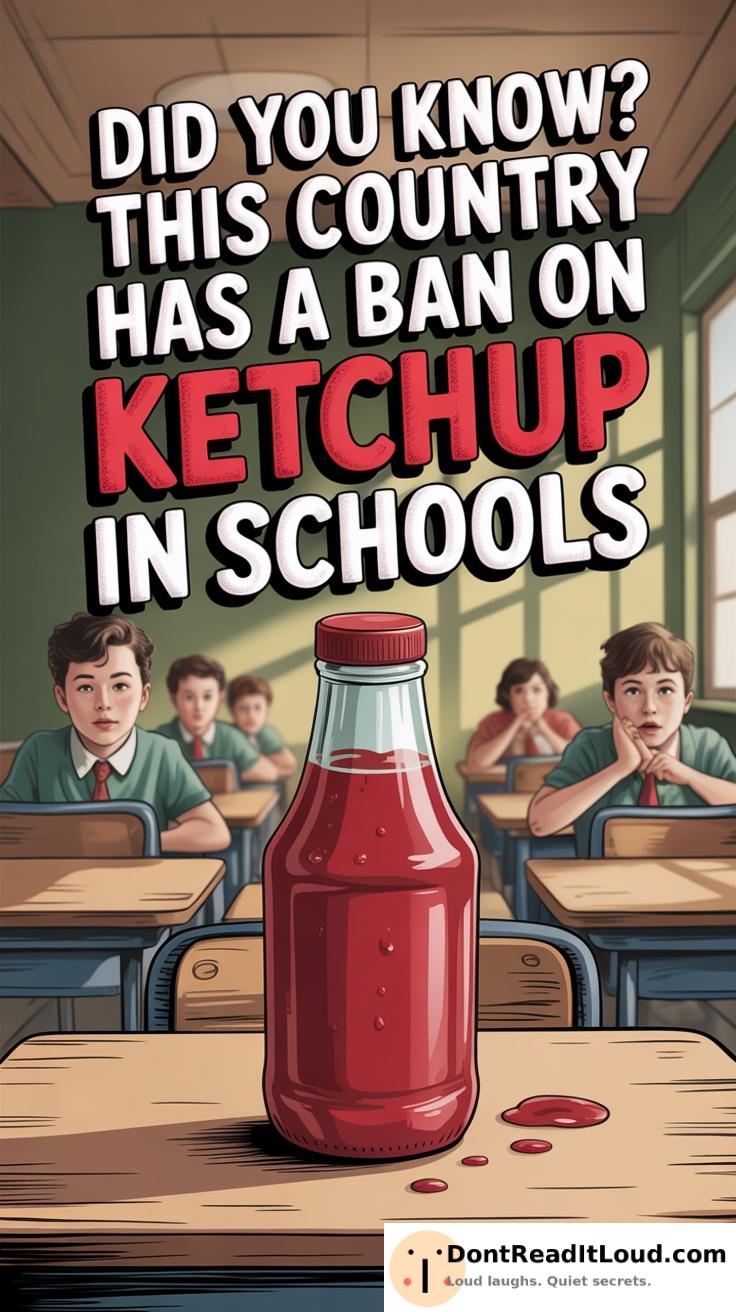
Did you know France banned ketchup in schools in 2011? The law helps preserve traditional cuisine and encourages healthier eating among students. By limiting sugary condiments, France highlights its commitment to quality meals and meaningful dining. Schools that break the rule risk penalties, showing how seriously the policy is taken. This approach demonstrates how culture and health can work together to promote better habits. Learn more about this fascinating policy!
The Origin of This Law

The law banning ketchup in schools was introduced in France in 2011 to help preserve French culinary traditions and encourage healthier eating among students. French officials worried about the growing impact of American fast food and the decline of traditional cuisine, which values fresh, local, and balanced meals.
Concerns about rising childhood obesity rates, a global issue France wanted to address, contributed to the law’s adoption. By restricting ketchup and similar condiments in school cafeterias, the policy aimed to help children enjoy and recognize the flavors of classic French dishes rather than covering them up with sweet or salty sauces.
This measure was part of the broader “Le Plan National Nutrition Santé” (PNNS), a campaign to improve nutrition and promote healthier lifestyles nationwide. The PNNS guidelines advise cutting back on processed foods high in sugar and fat, while encouraging the consumption of fruits, vegetables, and whole foods.
The ketchup ban was a symbolic gesture showing France’s commitment to these values and its dedication to protecting culinary heritage in a globalized world.
Under the law, ketchup could be served only with certain meals, such as French fries, and always in small amounts. This legislation reflects the importance France places on food culture and the role of education in teaching young people about nutrition and the joys of traditional cooking.
Why This Law Exists

In France, the ban on ketchup in school cafeterias exists for practical, cultural, and political reasons. The main goal is to protect traditional French cuisine and eating habits among young people. French culture values balanced meals and natural flavors, and ketchup’s strong taste is seen as overpowering.
Practically, the rule is part of a wider effort to encourage healthier eating in schools. Limiting processed condiments like ketchup helps reduce sugar and salt intake, supporting better diets for children.
This approach matches France’s public health goals to address rising obesity and related health concerns.
Politically, the law shows a commitment to defending French cultural identity against global influences. By limiting foreign products in school meals, lawmakers demonstrate dedication to French culinary traditions.
This also promotes national pride in French food, an essential aspect of the country’s image and appeal to visitors.
How This Law Reflects it’s Culture?

The country that bans ketchup in schools is France. This law highlights several important elements of French culture and values:
- Culinary Heritage: France’s deep culinary roots are central to its identity. Ketchup ban helps protect traditional French cuisine, encouraging children to appreciate local flavors instead of generic condiments.
- Promoting Healthy Eating: Healthy eating is highly valued in France. Restricting ketchup, which contains lots of sugar and additives, supports the goal of offering healthier food options to students.
- Education and Appreciation: French culture emphasizes teaching children to enjoy food and develop their taste from an early age. By limiting ketchup, schools help children savor and respect classic French dishes.
- Cultural Pride: The ban also shows pride in maintaining France’s unique culinary customs. It pushes back against the spread of fast food and globalized eating habits.
- Social Norms and Expectations: Mealtimes in France are seen as important social events. Discouraging ketchup reinforces a culture that values quality food and meaningful dining experiences over convenience.
What Happens If You Break This Law?

In the country where schools have banned ketchup, violating this law can lead to several outcomes.
Educational institutions that break the ketchup ban may be required to pay fines. The penalty amount often depends on how often and how seriously the rule is broken. Repeat violations may result in higher fines to discourage further infractions.
Legal action is usually directed at school officials or those running meal programs, rather than individual students. In some cases, administrators may have to explain the violation in a formal legal setting.
Public reactions can vary. Some parents and community members may agree with the ban, seeing it as a step toward healthier eating for children. Others might view the rule as too restrictive, leading to debates about freedom of choice in school meals.
Schools that don’t comply may face extra inspections or reviews by education authorities. Persistent violations could mean even tighter monitoring in the future.
Institutions might also be asked to run programs that educate students and staff about the government’s nutrition standards and the reasons behind the ban.
Could Other Countries Learn from This Law?

In recent years, some countries have taken unique approaches to promote healthier eating habits among children, one of which includes the ban on ketchup in school cafeterias. France, for example, has implemented such a ban as part of a broader initiative to preserve culinary traditions and encourage healthier eating among students. This law restricts the use of ketchup to only one day a week and only alongside dishes where it’s traditionally appropriate, such as French fries.
Comparison with Other Countries:
- United States: In contrast, the United States has been more focused on reducing overall calorie intake and improving the nutritional quality of school meals through measures such as the Healthy, Hunger-Free Kids Act. While ketchup remains widely available, the emphasis is placed on offering more fruits, vegetables, and whole grains.
- United Kingdom: The UK has also taken steps to improve school meals by setting standards for nutritional content. While there isn’t a specific ban on ketchup, schools are encouraged to limit the availability of high-sugar and high-fat condiments.
- Japan: Japanese schools offer a model that emphasizes balanced and nutritious meals, often focusing on traditional foods. While ketchup isn’t banned, the meals provided typically don’t include it as a staple, aligning more with local dietary practices.
- Finland: Known for its high educational and nutritional standards, Finland doesn’t impose a ketchup ban but ensures that school meals adhere to strict nutritional guidelines, focusing on fresh and local ingredients.
Can Other Countries Learn from France’s Ketchup Ban?
The French ketchup ban is part of a broader cultural effort to instill healthy eating habits and preserve culinary traditions. While other countries may not replicate the ban exactly, there are lessons to be learned:
- Cultural Integration: Countries could benefit from integrating local culinary traditions into school meal programs, promoting a connection to local food culture.
- Nutritional Education: Emphasizing nutritional education and awareness can help students make informed food choices, similar to France’s approach.
- Moderation and Balance: Rather than outright bans, promoting moderation and balance in condiment use could lead to healthier eating habits without alienating certain foods entirely.
- Policy and Flexibility: Each country’s approach should be tailored to its unique cultural and dietary context. What works for France may not work elsewhere, but the principle of encouraging healthier eating habits is universally applicable.
Conclusion: What Makes this Law So Unique
The ketchup ban in schools distinguishes the country with its innovative strategy to encourage healthier eating among students. This law stands out because it singles out a condiment that’s extremely popular in cafeterias around the world.
By limiting ketchup, the country demonstrates a strong commitment to cutting back on processed foods and added sugars, both linked to health problems like obesity and diabetes.
The ban’s strictness also reflects deeper cultural values, emphasizing traditional, nutritious meals instead of convenient packaged foods. This not only helps preserve culinary heritage but also teaches children to value wholesome eating early on.
Other nations might take inspiration from this law by recognizing how small dietary changes can benefit public health. While a ketchup ban may not work everywhere, the central idea of improving school food policies to support healthy habits is widely applicable.
Focusing on nutrition education and better food quality in schools can lead to lasting health improvements for future generations.



